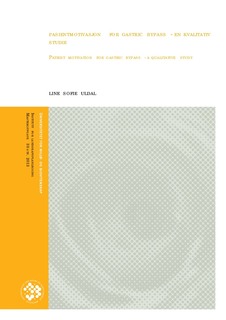| dc.description.abstract | SAMMENDRAG
Bakgrunn:
Overvekt og fedme utgjør en betydelig folkehelseutfordring. Vektreduserende kirurgi utføres i stadig økende grad i Norge. Denne studien ønsker å fokusere på hvilke faktorer som motiverte pasienter ved Aleris Overvektsklinikk til å gjennomgå gastric bypass-operasjon. Målet med studien har vært å avdekke pasientenes viktigste motivasjonsfaktorer, og diskutere dette opp mot relevant motivasjonsteori.
Metode:
Informantene ble rekruttert gjennom Aleris Overvektsklinikk tre måneder etter operasjon. Utvalget besto av seks pasienter, hvorav en mann og fem kvinner. Samtlige informanter hadde gjennomgått gastric bypass-operasjon ved Aleris. Data ble samlet inn gjennom semistrukturerte livsverdensintervjuer, og materialet ble deretter transkribert og analysert ved systematisk tekstkondensering. Maslows behovspyramide og Deci og Ryans selvbestemmelsesteori (SDT) ble brukt som teoretisk rammeverk.
Resultater:
Samtlige informanter uttrykte at det var deres egen avgjørelse å ta operasjonen, og at de ikke hadde følt seg presset av andre personer til å gjennomføre den. Funnene i studien viser at informantenes viktigste motivasjonsfaktorer for å gjennomgå gastric bypass var deres ønsker om bedre funksjon, få et høyere aktivitetsnivå, redusere risiko for vektrelaterte sykdommer, oppnå lengre levetid, bli et bedre forbilde for barna, øke tilfredsheten med egen kropp og få et bedre selvbilde.
Oppsummering:
Informantenes motivasjonsfaktorer viser at overvekten hindret dem i å dekke flere menneskelige behov, blant annet behovene for tilhørighet og selvaktelse. Det tyder også på at informantenes ønske om å gjennomgå gastric bypass var av stor personlig betydning for dem. Verdiene var internalisert i høy grad, noe som vitner om at avgjørelsen var basert på en sterk opplevelse av selvbestemmelse, selv om resultatene avdekket at samfunnets negative oppfatning av overvekt hadde blitt internalisert hos flere informanter.
ABSTRACT
Background:
Overweight and obesity constitute a substantial public health challenge. The number of bariatric surgeries performed in Norway is continuously increasing. The focus of this study was to uncover the motivational factors of patients undergoing gastric bypass surgery at Aleris Overweight Clinic. The aim of the study has been to uncover the informants’ strongest motivational factors, and discuss these with regard to relevant motivational theory.
Methods:
The participants were recruited through Aleris Overweight Clinic three months after surgery. The final selection consisted of six participants, wherein one man and five women. All participants had undergone gastric bypass surgery at Aleris. The data was gathered through semi-structured interviews, and the material was then transcribed and analyzed by using systematic text condensation. Maslow’s Hierarchy of Needs and Deci and Ryan’s Self-Determination Theory (SDT) were utilized as theoretical framework.
Results:
All participants expressed that it was their own decision to undergo surgery, and that they had not felt pressured by anyone. The findings in this study show that the participants’ main motivational factors to undergo gastric bypass were higher level of physical function and activity, reduced risk of weight related diseases, longer life expectancy, becoming a better role-model for their children, higher satisfaction with their own body and improved self-esteem.
Interpretations:
The participants’ motivational factors suggest that their overweight prevented them from fulfilling multiple human needs, such as the need for relatedness and self-esteem. The results also indicate that the participants’ wish to undergo gastric surgery was of great personal significance to them. Their values seemed highly internalized, which insinuates that their decision was based on a strong sense of self-determination, although the results uncovered that several participants had internalized society’s negative perception of overweight. | no_NO |
